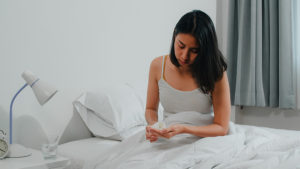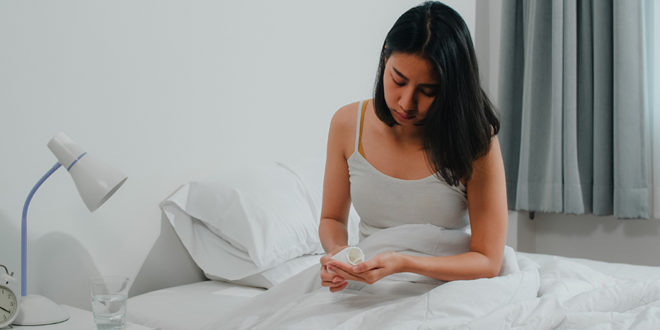 Do you have difficulty falling asleep at night? Do you frequently wake up during the night, or do you wake up too early? And, do you feel that you are not well-rested after a night’s sleep? Well, you may be suffering from insomnia, and you are not alone. Studies show that 10–30% of the population suffers from insomnia, with older adults, females, and people with medical and mental health conditions being the most vulnerable. Other symptoms of insomnia include tiredness or sleepiness in the day, irritability, anxiety, depression, difficulty paying attention and focusing on tasks, difficulty remembering, more likelihood of errors or accidents, and constant worries about sleep.
Do you have difficulty falling asleep at night? Do you frequently wake up during the night, or do you wake up too early? And, do you feel that you are not well-rested after a night’s sleep? Well, you may be suffering from insomnia, and you are not alone. Studies show that 10–30% of the population suffers from insomnia, with older adults, females, and people with medical and mental health conditions being the most vulnerable. Other symptoms of insomnia include tiredness or sleepiness in the day, irritability, anxiety, depression, difficulty paying attention and focusing on tasks, difficulty remembering, more likelihood of errors or accidents, and constant worries about sleep.
Insomnia makes it hard to fall asleep and to stay asleep, or it makes you wake up too early and unable to fall asleep again, making you feel tired and in a bad mood, thus affecting your health, work performance, and quality of life. Studies show that even partial sleep deprivation significantly affects mood, with one study by University of Pennsylvania finding that volunteers who were limited to only 4.5 hours of sleep a night for one week were more stressed, angry, sad, and mentally exhausted, and that when they resumed normal sleep, a striking improvement in mood was reported. Conversely, sleep can be affected by mood and mental state; anxiety and stress making the body aroused, awake, and alert, with those under constant stress tending to have sleep problems.
Rarely an isolated medical or mental illness, insomnia is a symptom of another illness, and it can be a result of a person’s lifestyle or work schedule, although psychiatric disorders are the leading cause. Studies show that while about 50 % of adults with insomnia suffer from a mental health problem, up to 90% of adults with depression have sleep problems. In addition, chronic insomnia can increase the risk of developing anxiety or depression. Studies have found that 15-20% of people with insomnia will develop major depression later on. One large-scale study showed that people with insomnia were five times more likely to develop depression, and 20 times more likely to develop panic disorder. Insomnia is a reliable predictor of depression and many other psychiatric disorders. Insomnia is also associated with sleep apnea, a condition where you stop breathing for a short period several times during the night.
Many adults experience short-term insomnia at some point in their lives, usually the result of stress or a traumatic event, and it can last for some days or weeks. However, there are some who have long-term insomnia (lasting for a month and more), where insomnia is the main problem, or it could be the result of other health conditions or medications. Studies on the brain mechanisms of insomnia have shown inconsistency, as have the effectiveness of available treatments. Believing that this could be because subtypes of this disease are not recognized, scientists at the Netherlands Institute for Neuroscience, in 2019, decided to investigate with a study in three parts. First, they analyzed results of up to 34 questionnaires (measuring personality traits linked to differences in brain function and structure) filled in by over 4000 volunteers in the Netherlands Sleep Registry, and came to the conclusion there are five subtypes of insomnia.
Type 1: Highly distressed: Scores high on personality traits like neuroticism (disposition to experience negative effects like anger, anxiety, depression, etc), and feeling down or tense.
Type 2: Moderately distressed but reward-sensitive: where responses to pleasurable emotions are intact.
Type 3: Moderately distressed and reward-insensitive.
Type 4: Slightly distressed with high reactivity: where insomnia symptoms vary with environment and life events.
Type 5: Slightly distressed with low reactivity.
Then, the findings were confirmed by evaluating a second, non-overlapping cohort of 251 volunteers recruited from new members of the sleep registry, and five years later, 215 volunteers from the first sample were reevaluated..The results showed that individuals had mostly conserved their type of insomnia from five years earlier.
Treatment
Recommendations by experts to help achieve adequate sleep include:
• Maintaining a regular schedule for going to sleep and waking
• Avoiding caffeine, alcohol, nicotine, etc.
• Creating a comfortable sleep environment and establishing a calming routine before bedtime
• Not watching the clock at night, but rather, going to sleep when you’re really tired
• Limiting light exposure in the evening
• Avoiding naps too close to regular bedtime
• Avoiding eating and drinking too much or too soon before bedtime
• Exercising regularly, but not near bedtime
Aside from the above, cognitive behavioral therapy for insomnia (CBT-I), medications, or both, may also be recommended. CBT-I helps to control or eliminate negative thoughts and actions that disturb sleep and may include the following: stimulus control therapy to remove factors that condition the mind to resist sleep (for example, avoiding naps, setting a consistent bedtime and waking-up time, and leaving the bedroom if you don’t fall asleep within 20 minutes, returning only when you’re sleepy); relaxation techniques like progressive muscle relaxation and breathing exercises; sleep restriction, wherein the time spent in bed is reduced and daytime naps are avoided, resulting in partial sleep deprivation, thus making you more tired the next night; and remaining passively awake, which is aimed at reducing the anxiety about being able to sleep by getting in bed and trying to stay awake, rather than expecting to fall asleep.
As far as medications are concerned, sleeping pills can help you get to sleep and stay asleep. Most sleeping pills are classified as “sedative hypnotics”. These include benzodiazepines, barbiturates, and various hypnotics. Generally, sleeping pills are not recommended for more than a few weeks, but several medications are approved for long-term use.
Here are some medications for the treatment of insomnia:
• Antidepressants: Some sedating antidepressant medications like trazodone, mirtazapine, and doxepine are effective for treating sleeplessness.
• Benzodiazepines: Benzodiazepines (e.g. diazepam, emazepam, traizolam, estazolam, flurazepam, temazepam, quazepam) are anti-anxiety drugs that increase drowsiness and help people sleep; however, all benzodiazepines are potentially addictive and can cause problems with memory and attention, and so are usually not recommended for long-term treatment of sleeping problems.
• Eszopiclone (Lunesta): This sleeping pill helps you fall asleep quickly, and studies show that those taking this medication sleep, on average, seven to eight hours a night.
• Lemborexant (Dayvigo): This sleeping pill works by suppressing the part of the central nervous system that keeps you awake.
• Ramelteon (Rozerem): This sleep medication, which can be prescribed for long-term use, works by targeting the sleep-wake cycle, and it is prescribed for those finding it difficult to fall asleep.
• Suvorexant (Belsomra): This sleeping pill blocks a wakefulness-promoting hormone called orexin, and is approved for treatment of people who have trouble falling asleep or staying asleep.
• Zaleplon (Sonata): Compared to other sleeping pills, this drug stays active in the body for the shortest period, which means you can try to fall asleep on your own, but if you tend to wake during the night, this is not the best choice.
• Zolpidem (Ambien): This sleeping pill is effective at making you fall asleep and is also available as an extended release version that helps you stay asleep longer. Also available is a prescription oral spray version for the short-term treatment of insomnia due to trouble in falling asleep.
• Over-the-counter sleep-aids: Most of these sleep-aids are antihistamines that cause drowsiness.
• Barbiturates: These drugs (phenobarbital, secobarbital, amobarbital, pentobarbital, nembutal) are also sedative hypnotics that are used to treat anxiety, insomnia, and seizure disorders, with nembutal commonly used as “end-of-life” medication for euthanasia, where allowed. However, because of their wide abuse, and with the availability of benzodiazepines and non-benzodiazepines, they are not prescribed as often for sleeping disorder, with their use limited for pre-operative sedation in hospitals.
• Melatonin: It is a hormone released at night by the pineal gland that is associated with control of the sleep-wake cycle. Darkness increases its production, while light decreases it. It is often used as a dietary supplement for short-term treatment of insomnia, such as from jet lag or shift work.
 Medicosnext
Medicosnext




